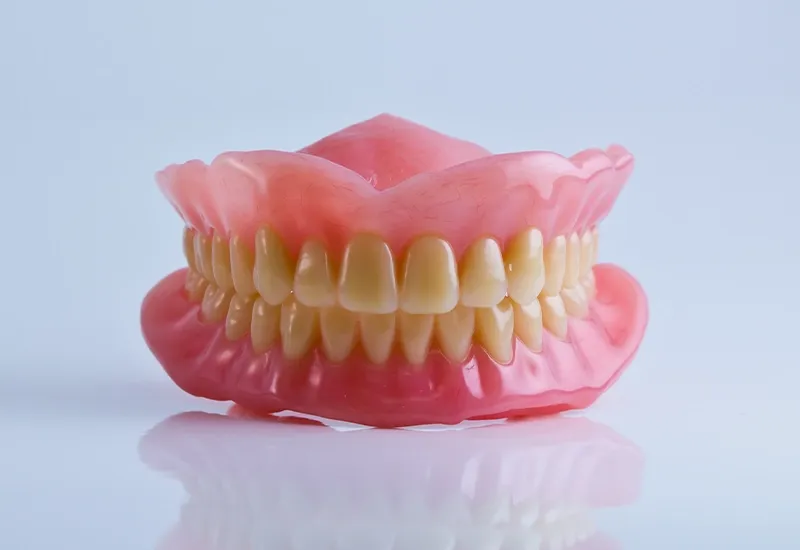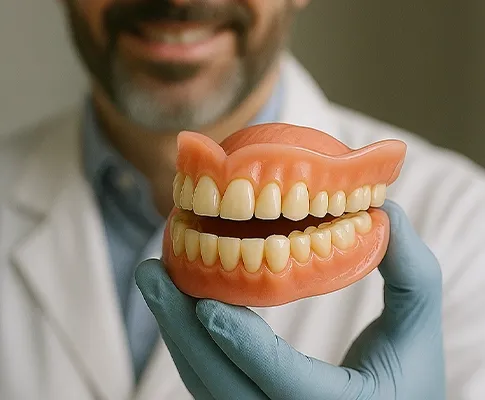
Dentures for Younger Patients: Are They a Good Option?
Dr. Azadeh Hosseini
30 September 2025
When most people think about dentures, they imagine older adults who have lost their teeth due to age-related conditions. However, the reality is that tooth loss can occur much earlier in life, raising questions about dentures for young adults. For those facing early tooth loss, whether from trauma, genetics, or disease, dentures may sometimes be a necessary solution. This raises important questions: Can young people wear dentures? Is it normal to have dentures in your 30s? Do teens get dentures? Exploring these concerns helps highlight the unique challenges and considerations for younger patients with dentures.
Why Would Someone Young Need Dentures?
Although dentures are most often associated with aging, the reality is that young people and dentures are not as uncommon as many assume. Tooth loss can occur at any stage of life, and several factors may lead to the need for dentures under 40. In some cases, premature tooth loss happens because of untreated decay or periodontal issues that weaken teeth beyond repair. Others may experience dental trauma, such as sports injuries or accidents, that result in multiple missing teeth. There are also individuals with congenital absence, where certain permanent teeth never develop, creating noticeable gaps that require replacement. Additionally, failed restorations or necessary extractions can leave a person without enough natural teeth to function comfortably.
Dentures for Young Adults: Stigma and Reality
The thought of needing dentures in one’s 20s, 30s, or even teens often come with emotional challenges. Many ask, “Is it normal to have dentures in your 30s?” While not the standard, it is certainly not unheard of. Tooth loss is not always linked to aging it can strike young people due to reasons unrelated to lifestyle or negligence.
Younger patients with dentures often worry about social perceptions or whether their lives will feel restricted. However, advances in dental technology have made dentures more natural-looking, comfortable, and discreet. For some, especially those dealing with early tooth loss, dentures can be life-changing by restoring confidence and functionality.
Do Teens Get Dentures?
While less common, do teens get dentures? The answer is yes. Adolescents can experience congenital absence of teeth, severe dental trauma, or medical conditions that result in permanent tooth loss. In such cases, partial prosthesis may be recommended to fill the missing spaces.
Teenagers with dentures face unique concerns. Their mouths and jaws are still developing, which may mean adjustments or replacements are needed more often than in adults. Despite these challenges, dentures can serve as a temporary or long-term solution that supports both dental health and emotional wellbeing.
Partial Dentures vs. Full Dentures in Younger Patients
When considering dentures for young adults, it is essential to distinguish between a partial prosthesis and full dentures, since not every patient under 40 experiences complete tooth loss. For many younger patients with dentures, partial options are appropriate when several teeth are missing but healthy ones remain. These devices restore balance in chewing, help preserve natural alignment, and reduce excessive strain on the remaining teeth. In contrast, full dentures may be necessary when premature tooth loss leaves a patient without any natural teeth, often due to severe disease or significant dental trauma. The decision between partial and full dentures depends largely on the extent of tooth loss and overall dental health. In both cases, the main objective is to restore function and appearance while also accounting for age-related suitability so younger individuals can adapt with confidence.

Functional and Emotional Considerations
For younger patients with dentures, the experience involves more than just physical adaptation. On a functional level, dentures restore the ability to chew properly, speak clearly, and maintain facial structure. On an emotional level, they help individuals navigate the self-esteem issues that often accompany early tooth loss.
Young people often have careers, social lives, and family responsibilities that make oral appearance and functionality especially important. The adjustment period may feel daunting, but with time, dentures can become a normal part of daily life. This reality answers the question, “Are dentures a good option for young adults?” For many, they provide the only immediate and reliable way to regain quality of life.
Long-Term Suitability and Maintenance
Another aspect of dentures under 40 is the long-term plan for oral health. Since dentures do not last forever, young people and dentures will often face the need for replacements, relining, or adjustments throughout their lives. Unlike older patients who may require fewer adjustments due to age, younger individuals often experience more changes in their oral structure over time.
This raises the practical consideration: Why would someone young need dentures if they will need frequent replacements? For many, the answer is necessity. Tooth loss at a young age requires an immediate solution, and dentures whether full or partial provide that option while maintaining oral health and functionality until longer-term treatments may be explored.
Emotional Adjustment and Social Impact
The emotional journey of younger patients with dentures should not be overlooked. For someone in their 20s or 30s, the idea of wearing dentures may initially feel isolating. Concerns about professional interactions or being perceived as older are common. Addressing these feelings is an important part of the overall treatment process.
Over time, most patients adjust and find that dentures become just another aspect of their routine. While is it normal to have dentures in 30s is a question that often carries stigma, reframing the discussion around necessity and self-care helps young people accept their treatment choice.

Need any help?
Contact UsAdjusting to Life with Dentures at a Younger Age
Adapting to dentures at a younger age often requires patience, but most individuals find that daily activities such as eating, speaking, and smiling improve significantly over time. While the initial adjustment period may feel challenging, persistence helps younger patients gain confidence and integrate dentures into their lifestyle without disruption.
Conclusion
The idea of dentures for young adults may seem unusual, but for those experiencing early tooth loss, it can be the most practical and effective option. From teens with dentures due to congenital conditions to adults in their 20s or 30s facing premature tooth loss, dentures offer a path to restored function, appearance, and confidence.
So, can young people wear dentures? Absolutely. While not the norm, younger patients with dentures exist and thrive with the right support and adaptation. Whether it involves partial prosthesis or full dentures, the goal is always the same: to replace missing teeth in a way that suits the individual’s needs.
If you are wondering, “Are dentures a good option for young adults?”, the answer lies in your unique dental health circumstances and goals. Dentures remain a viable and realistic choice for restoring oral health and quality of life at any age.
Resource:
How Often Should You Get a Dental Cleaning? Dentist Recommendations
Disclaimer
*This media/content or any other on this website does not prescribe, recommend, or prevent any treatment or procedure. Therefore, we highly recommend that you get the advice of a qualified dentist or other medical practitioners regarding your specific dental condition. *
